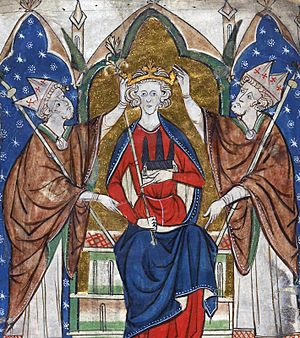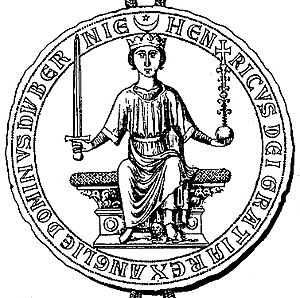Provisions of Oxford facts for kids
The Provisions of Oxford were a set of important rules made in England in 1258. They were created during a special meeting called the Oxford Parliament. These rules aimed to solve a big disagreement between King Henry III and his powerful nobles, known as barons.
The main goal of the Provisions was to make sure the king followed the law and listened to his barons' advice. A group of fifteen barons was chosen to guide the king and watch over his officials. Also, the Parliament was supposed to meet three times a year.
Like the earlier Magna Carta, the Provisions of Oxford showed that the barons could challenge the king's power. However, King Henry III later refused to follow these rules, which led to a war called the Second Barons' War. The king won the war, and his power was restored.
Contents
Why Were the Provisions of Oxford Needed?
King Henry III's Early Reign
Henry III became king when he was still a child. Because of this, a temporary government was set up to rule for him. William Marshal, 1st Earl of Pembroke, a very important noble, was in charge until he died in 1219.
The king was declared old enough to rule in 1223. After Marshal's death, the government was led by other powerful officials. These officials, like Hubert de Burgh, Earl of Kent and Peter des Roches, gained a lot of power and wealth for themselves. This made the barons unhappy, and eventually, these officials were removed from their positions.
Changes in Royal Power
Traditionally, the king chose his own officials. But during Henry's childhood, Parliament had started to have a say in who was chosen. Important government jobs, like the justiciar (a chief judge) and the chancellor, used to help keep the king's power in check.
However, under Peter des Roches, the king started to make these important jobs less powerful. He gave more power to officials within his own royal household. For example, the chief justiciar lost most of its power. The king also took control of the Great Seal, which was used to make official documents. This meant the king had fewer limits on his decisions.
Barons' Concerns and Foreign Influence
After 1240, the king's closest advisors were often foreigners. These included relatives of his wife, Eleanor of Provence, and his own half-brothers from another country. Many barons formed a group to oppose this. They did not like a government controlled by people from outside England.
The barons also worried about King Henry's expensive plans. He wanted to conquer the Kingdom of Sicily for his second son, Edmund Crouchback. To pay for this, the king demanded more and more taxes. These issues made the barons determined to make changes.
How the Provisions Were Created
The Committee of Twenty-Four
In the spring of 1258, King Henry III asked Parliament for money. But the barons refused to give it to him unless he agreed to major reforms. They insisted on creating a special committee of twenty-four members.
Twelve members were chosen by the king, and twelve were chosen by the barons. Five of the king's choices were foreigners. Among the barons' choices, only one was a foreigner, Simon de Montfort, 6th Earl of Leicester. This committee then presented their reform plan at the Oxford Parliament in June 1258.
What Reforms Did the Provisions Bring?
The Provisions of Oxford focused on three main areas:
- How important officials were chosen and controlled.
- The role of the king's council.
- How Parliament would work.
Controlling Key Officials
The important job of justiciar was brought back. In the past, the justiciar had been the king's main minister. The new justiciar would be a member of the king's council. They would oversee all courts and could hear appeals from other courts. This person would serve for only one year and be answerable to the king's council, not just the king. This was a big change, as it made the chief judge much more independent. Hugh Bigod, who was liked by both the king and the barons, became the new justiciar.
The chancellor and treasurer also had their terms limited to one year. They were not allowed to take direct orders from the king. Control of the king's money was given to the exchequer, a special office. This stopped the king from spending royal income as he pleased. Local officials, like sheriffs, also had one-year terms. Sheriffs were to be chosen from local knights and paid well to prevent them from taking bribes. New castellans (keepers of castles) were also appointed to manage royal castles.
Reforming the King's Council
The king's council was also changed to better advise and control the king. The committee of twenty-four chose fifteen counselors. Nine of these represented the barons. These fifteen people were to advise the king on all important matters.
The Fifteen included:
- Simon de Montfort, 6th Earl of Leicester
- Richard de Clare, 6th Earl of Gloucester
- Roger Bigod, 4th Earl of Norfolk
- John du Plessis, 7th Earl of Warwick
- Humphrey de Bohun, 2nd Earl of Hereford
- William de Forz, 4th Earl of Albemarle
- Peter of Savoy
- John fitzGeoffrey
- Peter de Montfort
- Richard Grey
- Roger Mortimer
- James Audley
- Boniface of Savoy, Archbishop of Canterbury
- Waltere Cantilupe, Bishop of Worcester
- John Mansel
While the Fifteen guided the king's council, they were not the only members. The justiciar, treasurer, and chancellor were always part of it. The king could also include other advisors. It was hard for all fifteen to always be with the king. So, at regular meetings, two or three of them would decide if a matter was important enough to call the full group. Also, the chancellor had to promise not to use the Great Seal for any major decision without most of the Fifteen agreeing.
Changes to Parliament
Parliament was also reformed. It was decided that there would be three parliaments each year. These meetings would discuss the needs of the kingdom and the king. Attending three parliaments a year would be a lot of work for the barons. So, the twenty-four members asked Parliament to choose twelve representatives. These twelve would attend the regular parliaments. This rule made sure that at least a minimum number of representatives would always be present.
What Happened Next?
The agreement was written down and sent to the sheriffs in all English counties. It was written in three languages: Latin, French, and, importantly, Middle English. Using English was a big deal. It showed that the English government was becoming more "English" again. This was a change from the French influence that had grown in the years before. The Provisions were the first government documents published in English since the Norman Conquest about 200 years earlier.
The Provisions of Oxford were later confirmed and expanded in 1259 by the Provisions of Westminster. The reforms also included control over the royal household. The barons decided not only who the main household members were but also lower servants, like cooks. King Henry was treated almost like a child who couldn't make his own decisions.
However, King Henry eventually overturned the Provisions of Oxford in 1261. He was helped by a special order from the Pope. This led to the start of the Second Barons' War (1263–1267). The king was defeated at the Battle of Lewes in 1264. For the next year, Simon de Montfort became the real ruler of England. But Henry was still officially king. The rebels never thought about removing him. Instead, Montfort called a Parliament to approve a new way of governing the king. This Parliament chose three electors who would then pick a council of nine. The king was supposed to rule based on the advice of this council.
In the end, the king and his supporters won the war. The Provisions of Oxford were finally cancelled in 1266 by the Dictum of Kenilworth. Even so, many of the changes to government and laws that the barons started were later adopted and confirmed in the Statute of Marlborough.
See also
 | Victor J. Glover |
 | Yvonne Cagle |
 | Jeanette Epps |
 | Bernard A. Harris Jr. |



